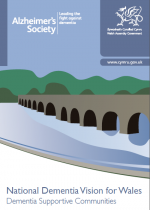WaMH in PC's blog
English Health Care Stuggling With Dementia

The Care Quality Commission found dementia patients in hospital are more likely to face longer stays, be readmitted and die there while care homes are not doing enough to keep patients well.
The Commission announced the conclusions after reviewing more than 20,000 of its inspections and analysing existing data and the news spread right across the BBC after it broke yesterday.
For further information please read Nick Triggle's Health and care system 'struggling with dementia' story on the BBC
Unfortunately, dementia is not just a problem affecting England with statistics showing that just over 42,700 people currently live with dementia in Wales.
Much work has taken place in Wales recently to identify the areas that need to be addressed to improve the lives of those with and affected by dementia in the hope that situations like those highlighted by the Commission don't become the norm in our own health care system.
This has led to the creation of the National Dementia Vision for Wales which provides a long-term vision to ensure Wales can best meet the challenge of an increasing number of people living with dementia across the country.
If you have any questions about WaMH in PC's work with dementia in Wales please visit the Dementia section on this site or contact us via email at lhills@rcgp.org.uk or on 029 2050 4516.
Online Support From Action on Hearing Loss

Action on Hearing Loss is the new name for the RNID and has more than 1,000 staff, 1,092 volunteers and more than 20,000 members who support its work across the UK.
The organisation's aim is to create a world where hearing loss doesn’t limit or label people and where people value and look after their hearing and they have a resource-packed website to help support this goal.
One of its more important sections is entitled Supportng You where you can find the answers to a range of questions related to deafness and hearing loss.
This includes specific GP Support section where you will find information about the impact of undiagnosed hearing loss, how to give the best service possible to patients with hearing loss and making your surgery accessible among other things.
There is also a comprehensive Care and Support section where individuals, carers and professionals can find out about how the organisation can provide advice and support to help them find services to meet their needs.
For further information you can contact the Action on Hearing Loss Information Line via telephone at 0808 808 0123, via textphone at 0808 808 9000, via SMS at 0780 0000 360 or via email at informationline@hearingloss.org.uk.
Self-Help Prescription For Severe Depression
We noticed a story online which outlined how a new study has concluded that self-help books or websites should be offered routinely to patients with severe depression.
The research - published in the British Medical Journal - comes after the RCGP endorsed a scheme by the Reading Agency charity for GPs to prescribe self-help books to patients with anxiety, depression or relationship problems.
It found that people with severe depression experience at least as much improvement in their symptoms by reading self-help material as those with milder depression with full details available on the following link - Self-help books should be prescribed for severe depression.
On the same front, the Welsh Government already runs a self-help book programme to help people with mild to moderate emotional problems called Book Prescription Wales which prescribes self-help books which people borrow from any branch library across Wales.
The scheme helps people access information, guidance and tips on ways to self-manage their conditions with further information available by downloading the Book prescription Wales - information leaflet.


